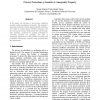Free Online Productivity Tools
i2Speak
i2Symbol
i2OCR
iTex2Img
iWeb2Print
iWeb2Shot
i2Type
iPdf2Split
iPdf2Merge
i2Bopomofo
i2Arabic
i2Style
i2Image
i2PDF
iLatex2Rtf
Sci2ools
103
Voted
ICDE
2006
IEEE
2006
IEEE
Privacy Protection: p-Sensitive k-Anonymity Property
In this paper, we introduce a new privacy protection property called p-sensitive k-anonymity. The existing kanonymity property protects against identity disclosure, but it fails to protect against attribute disclosure. The new introduced privacy model avoids this shortcoming. Two necessary conditions to achieve p-sensitive kanonymity property are presented, and used in developing algorithms to create masked microdata with p-sensitive k-anonymity property using generalization and suppression.
Database | ICDE 2006 | Kanonymity Property | Kanonymity Property Protects | Privacy Protection Property |
| Added | 11 Jun 2010 |
| Updated | 11 Jun 2010 |
| Type | Conference |
| Year | 2006 |
| Where | ICDE |
| Authors | Traian Marius Truta, Bindu Vinay |
Comments (0)

